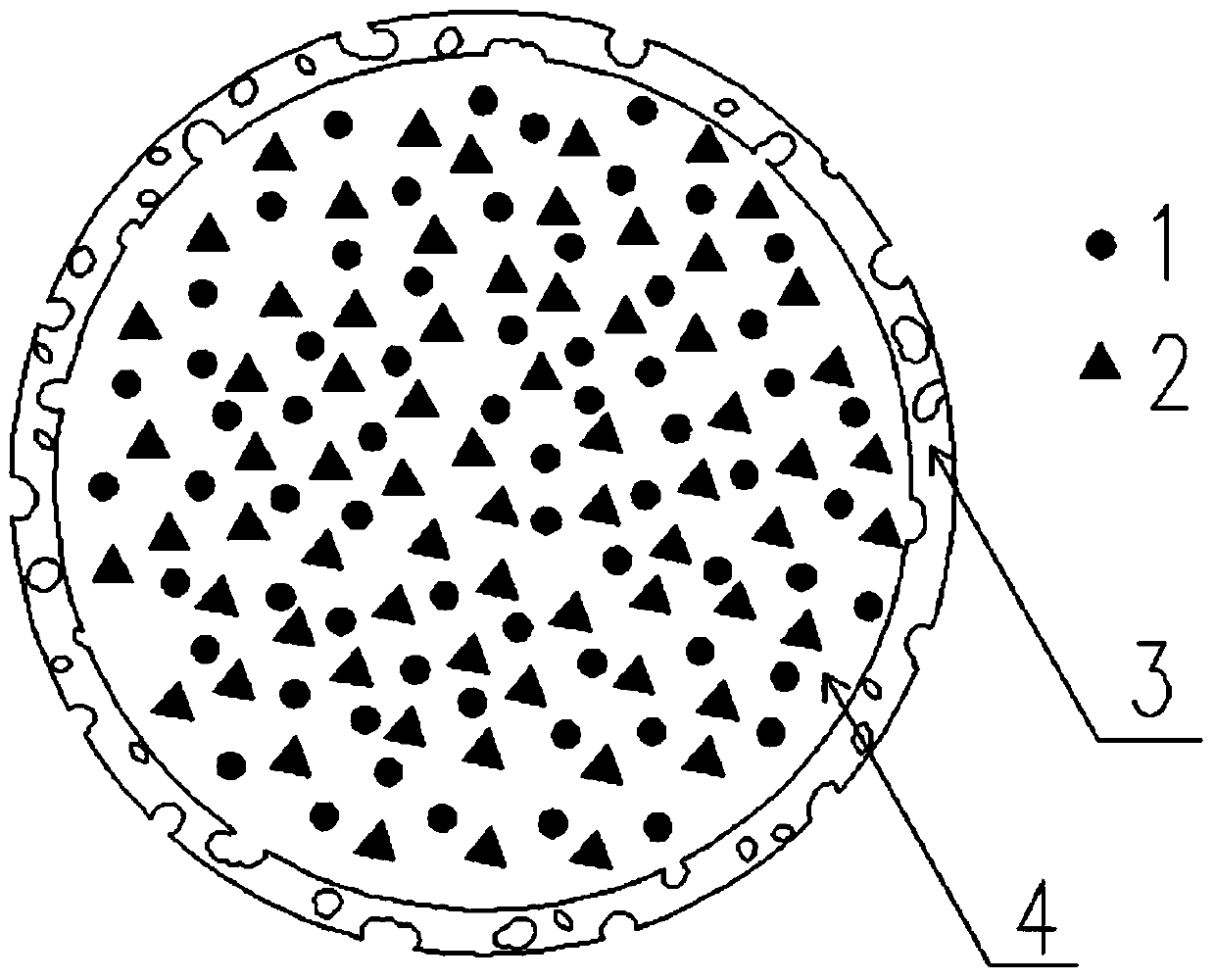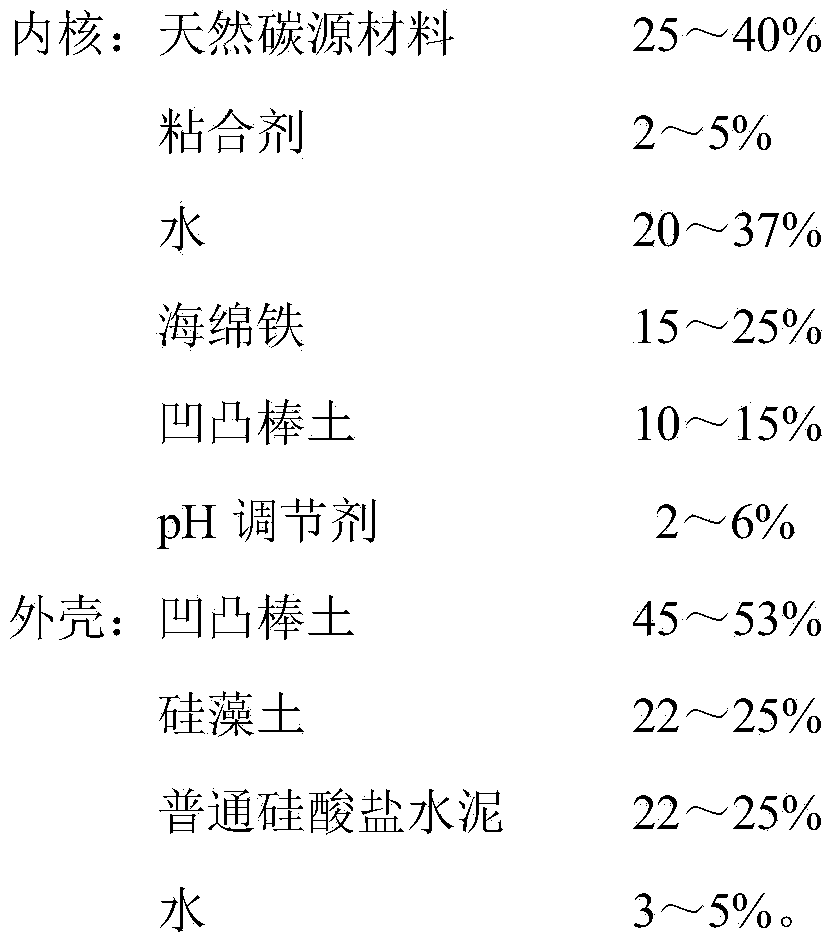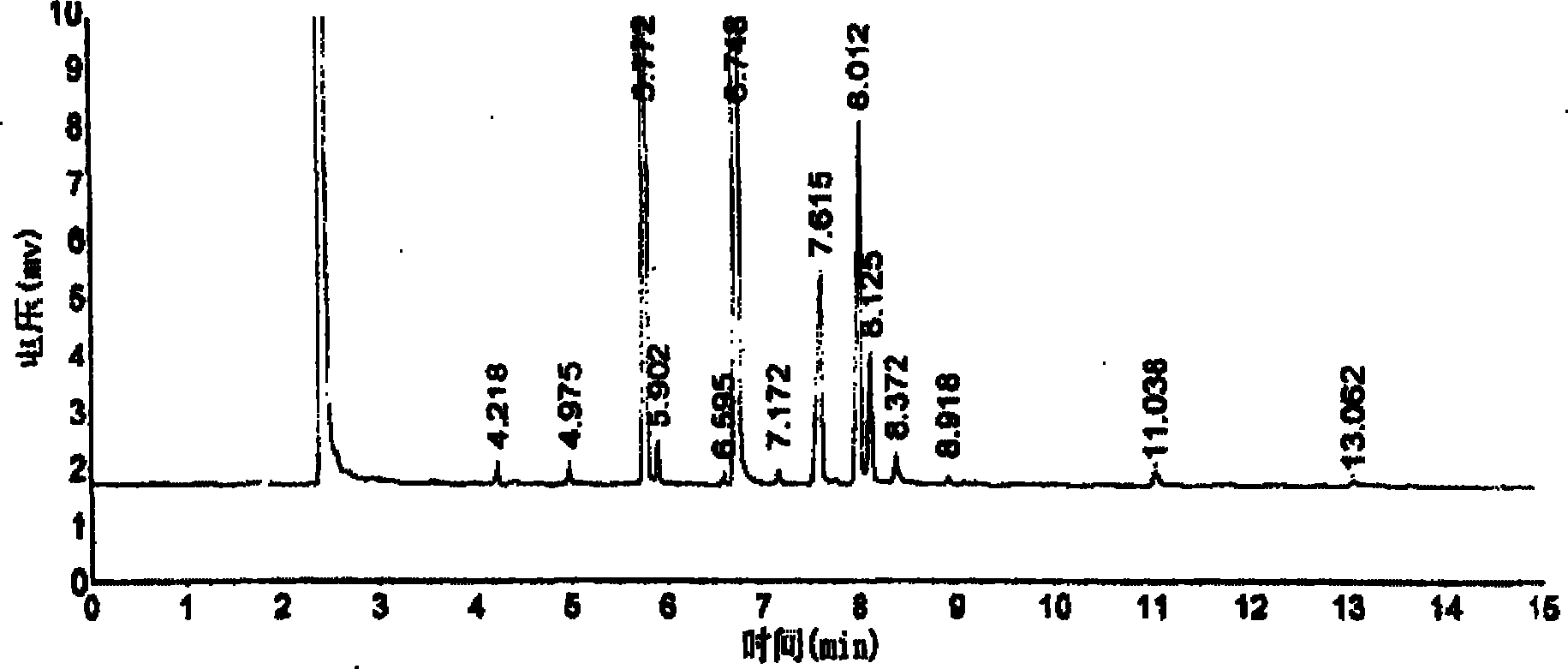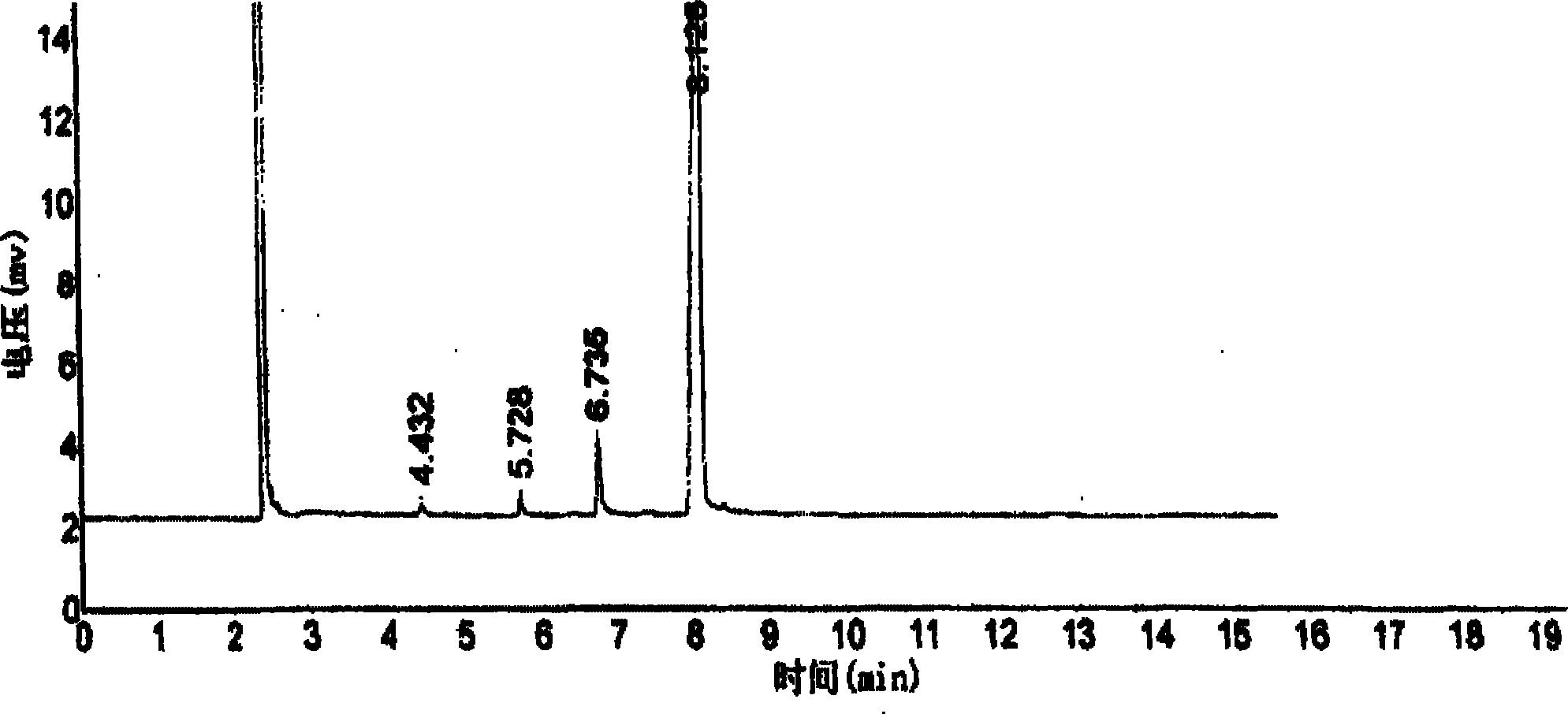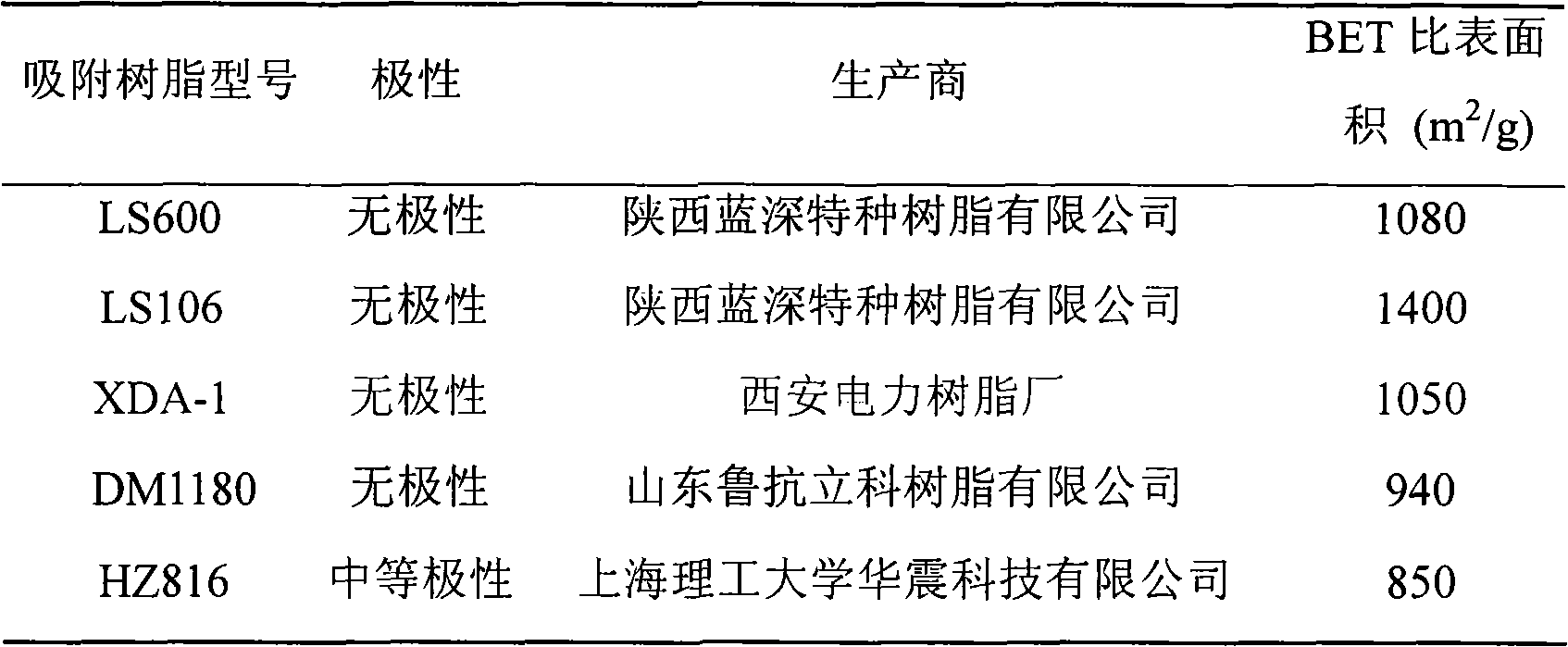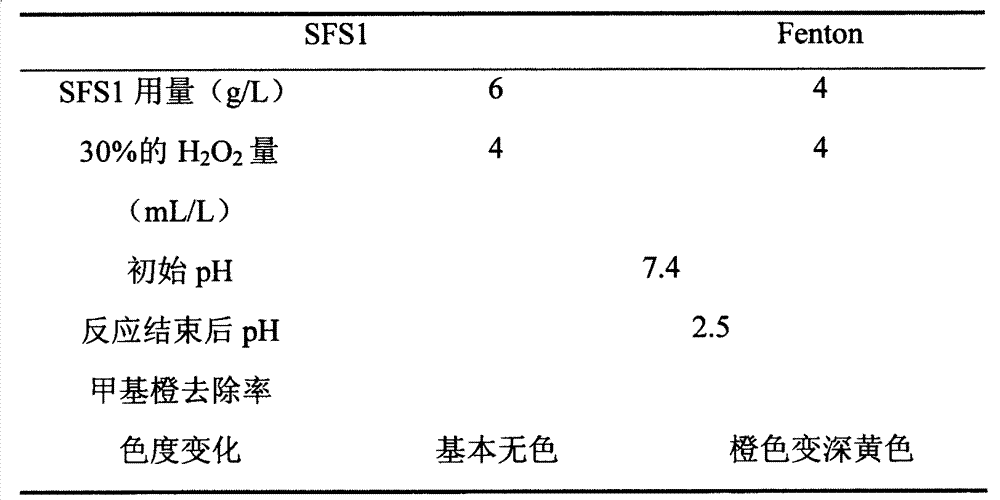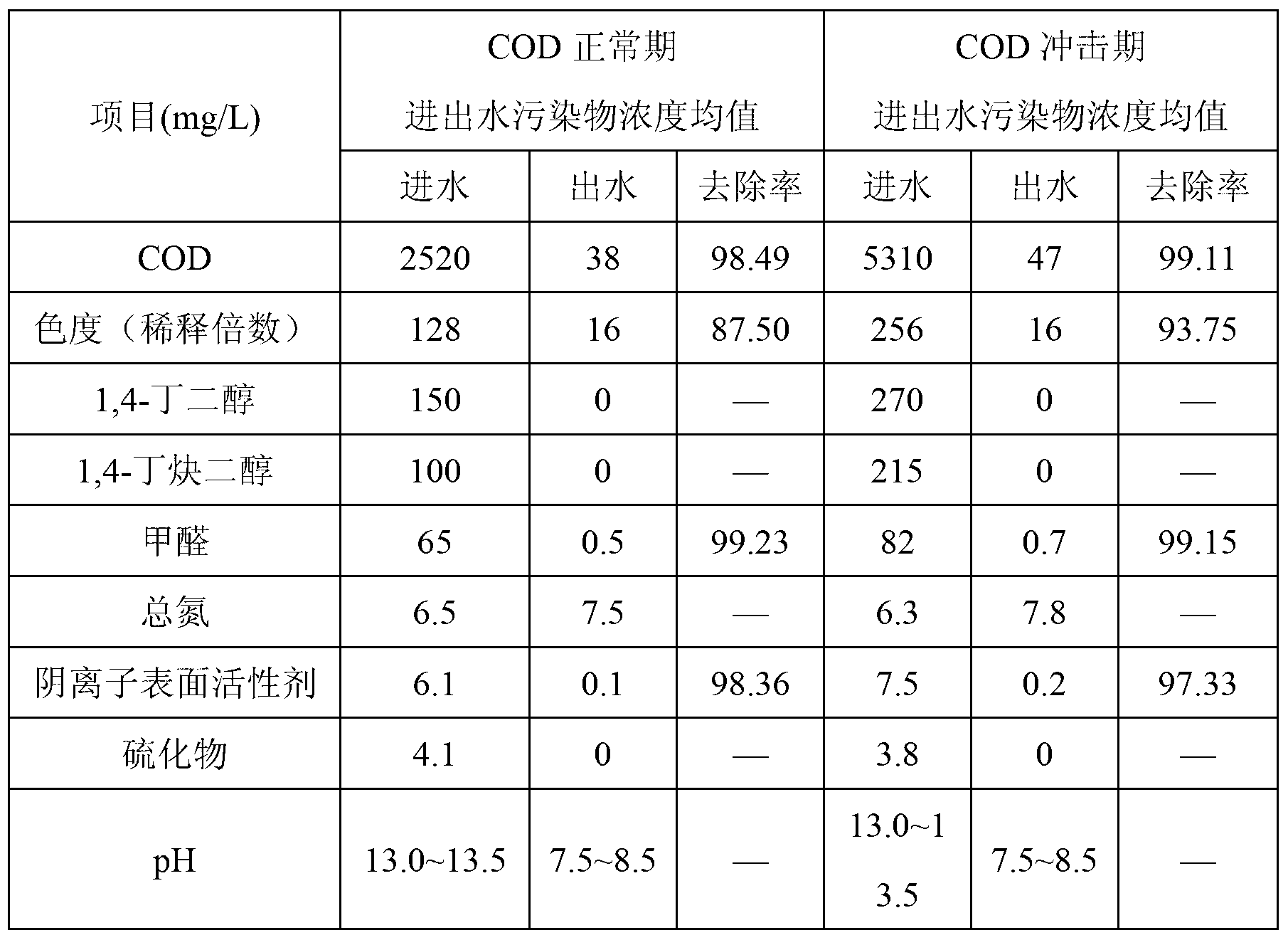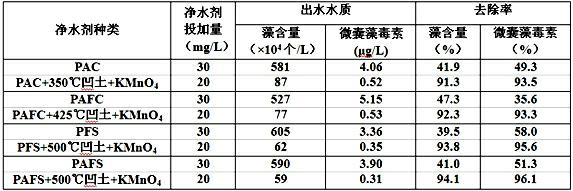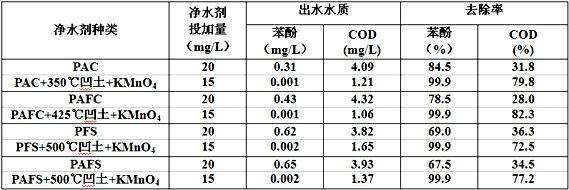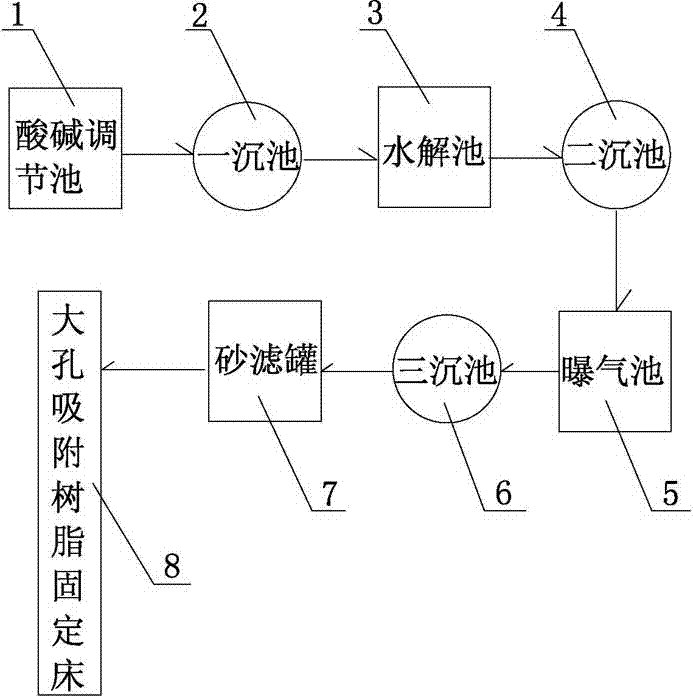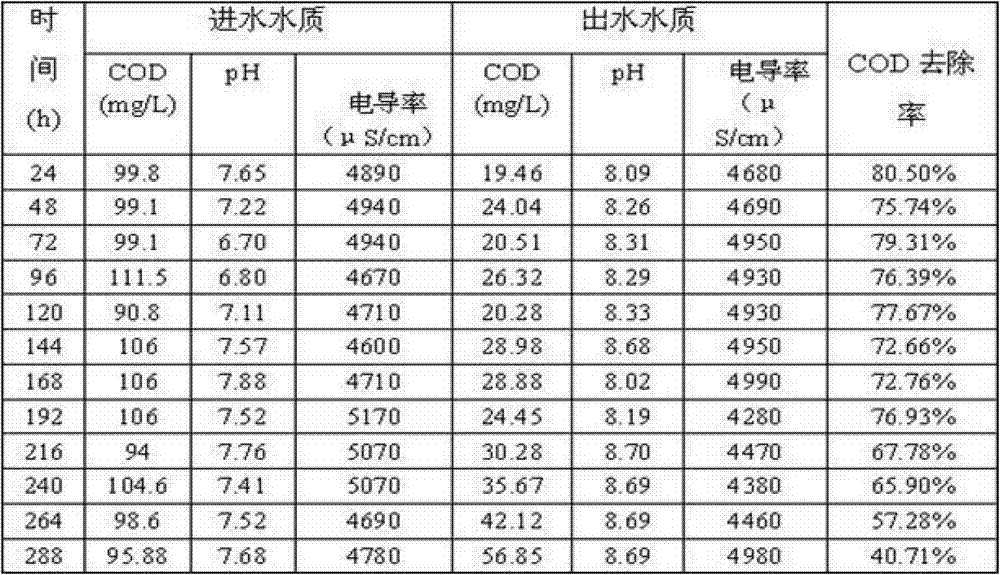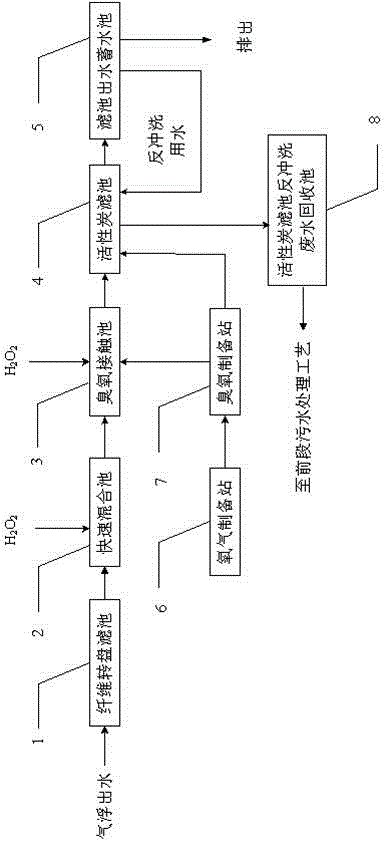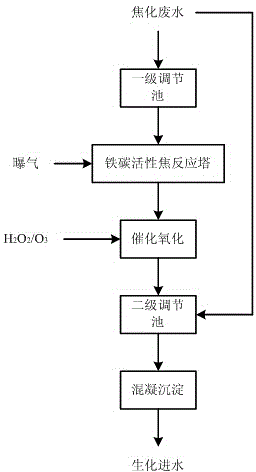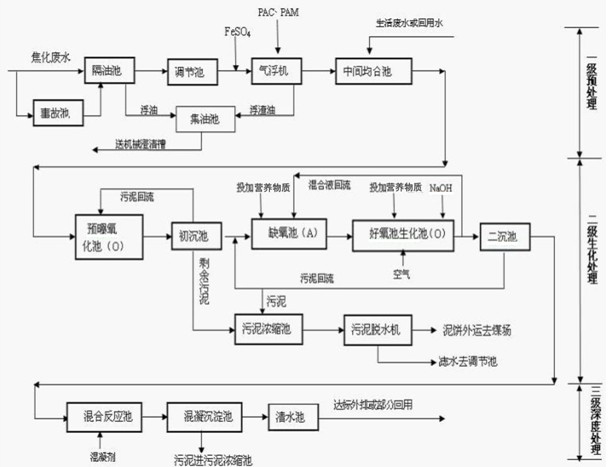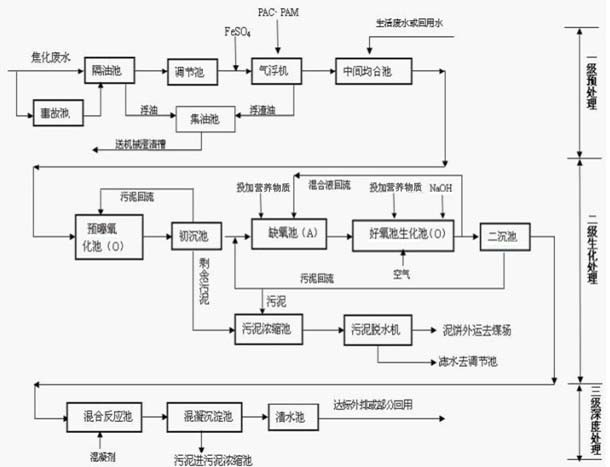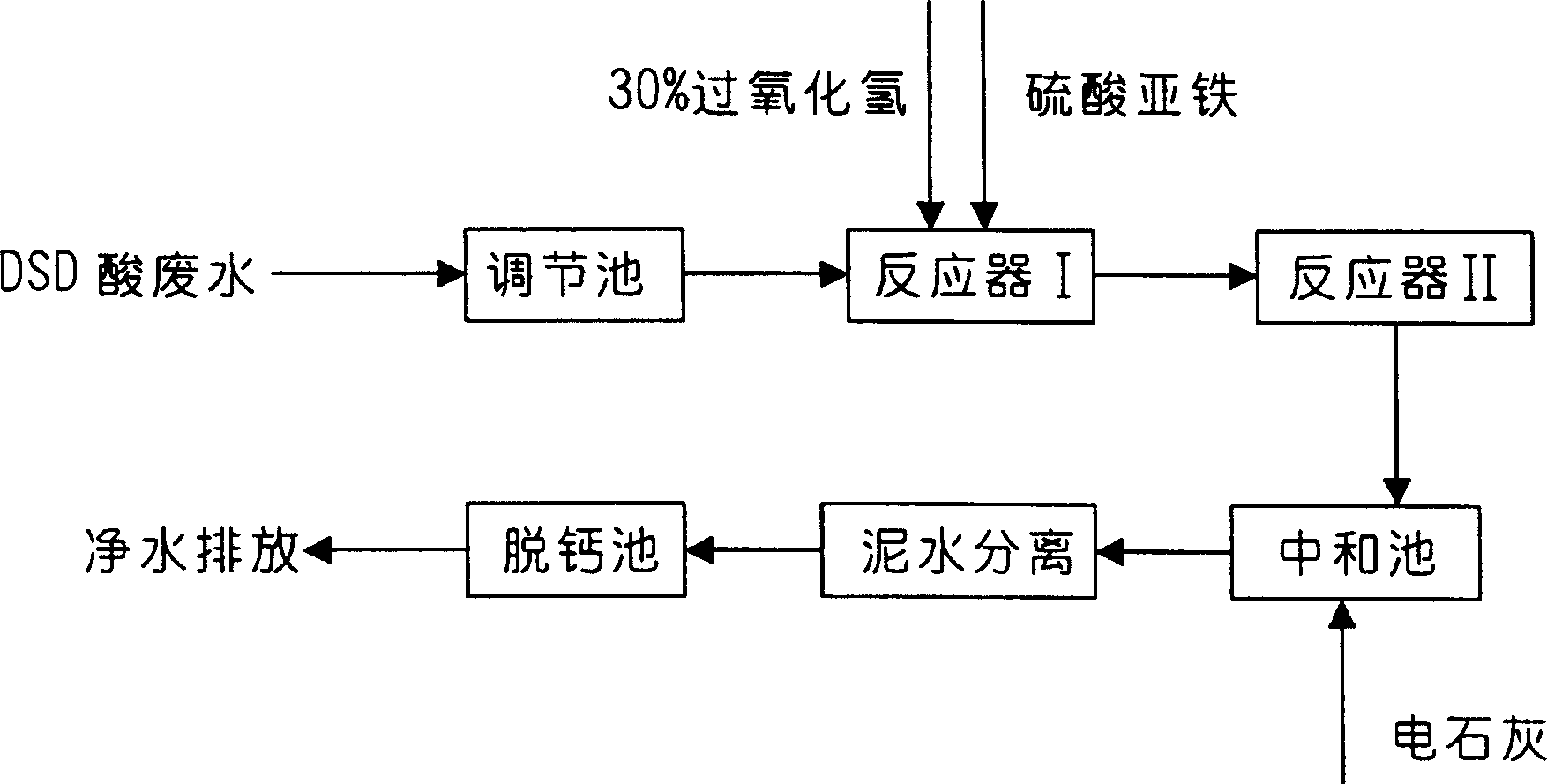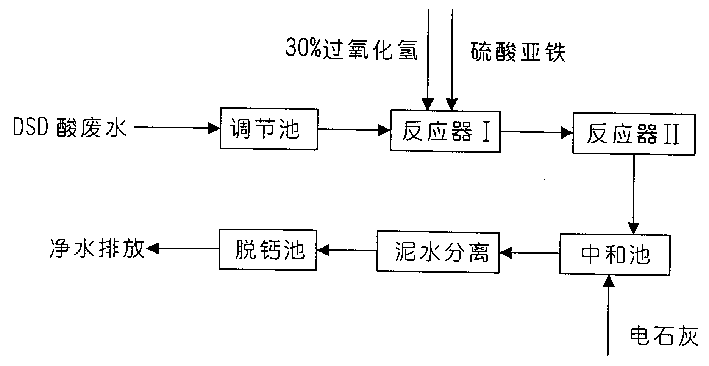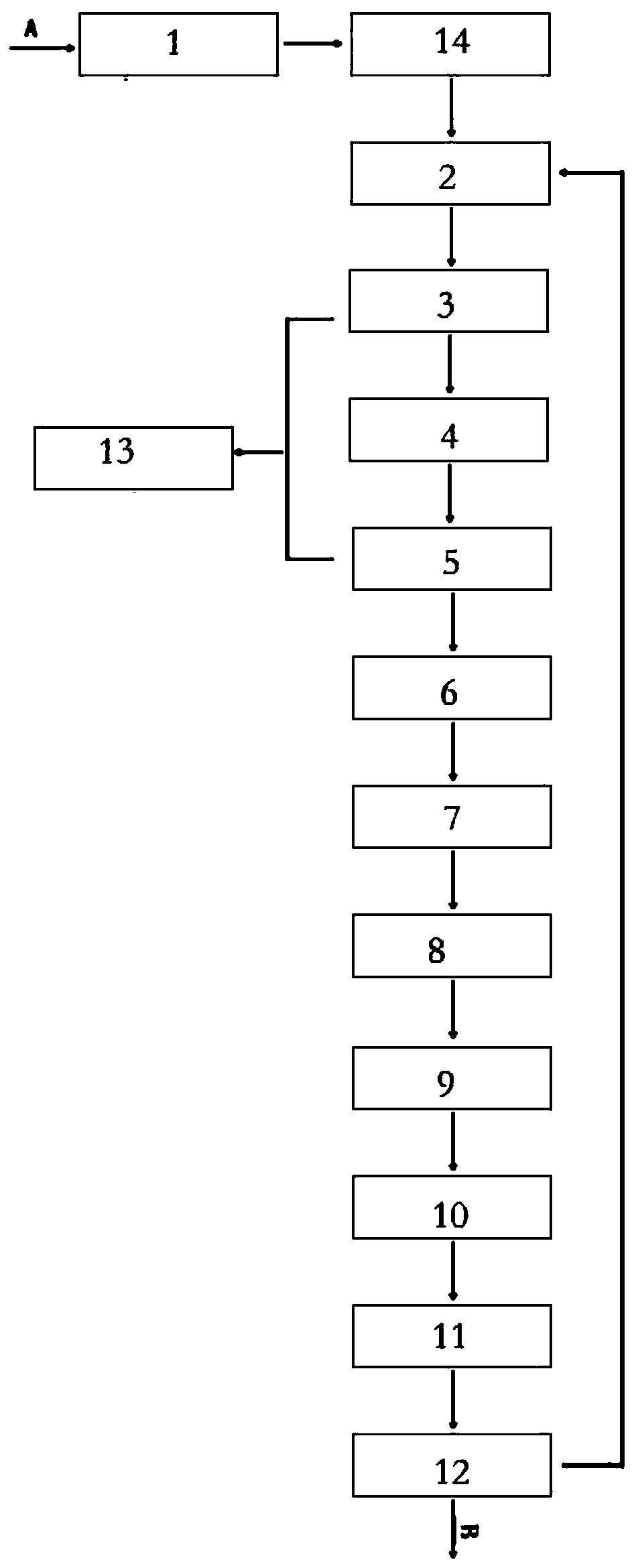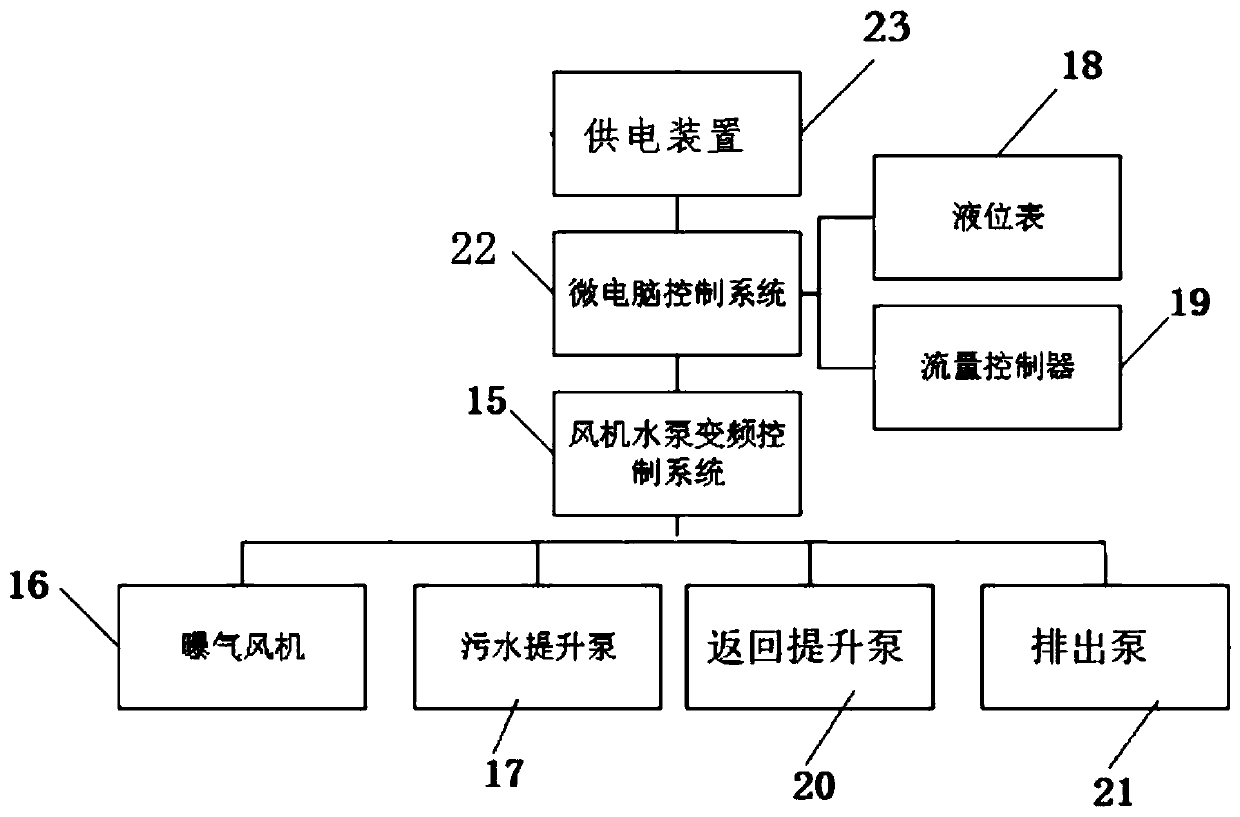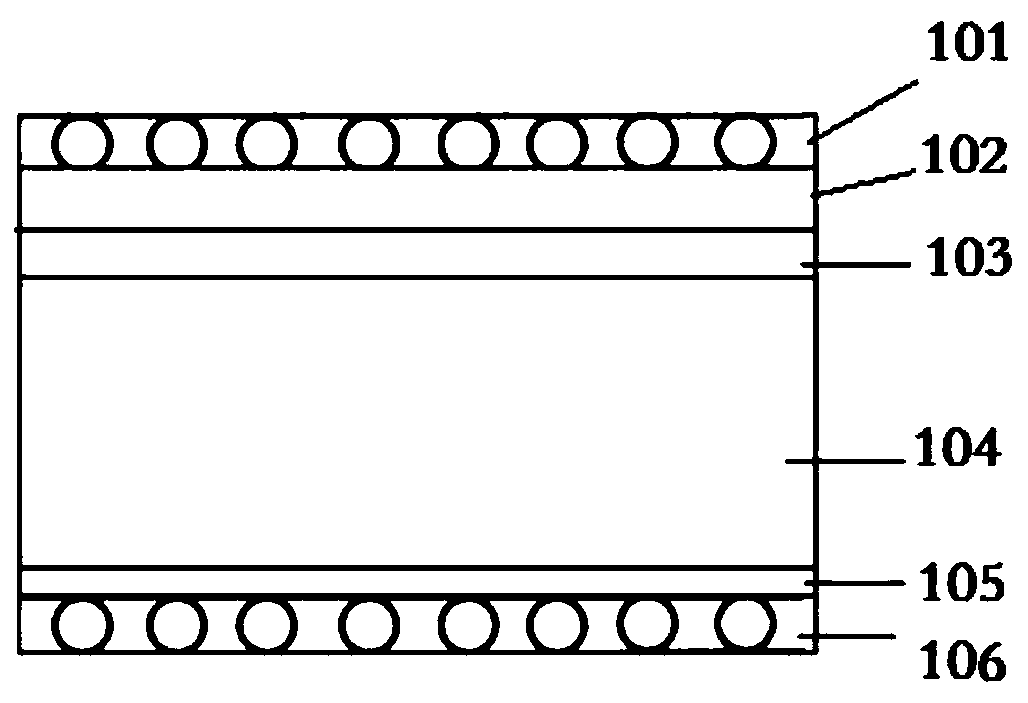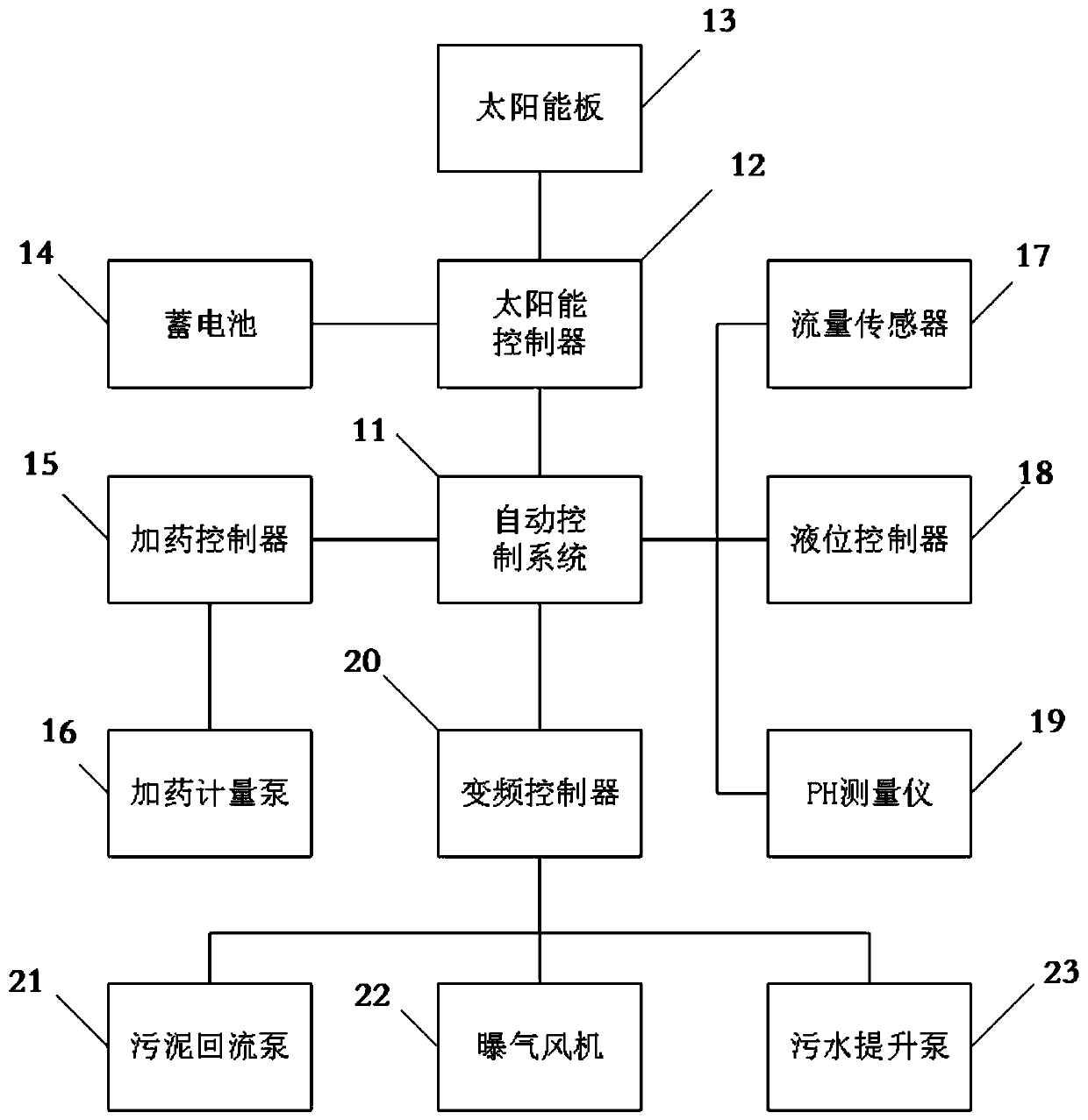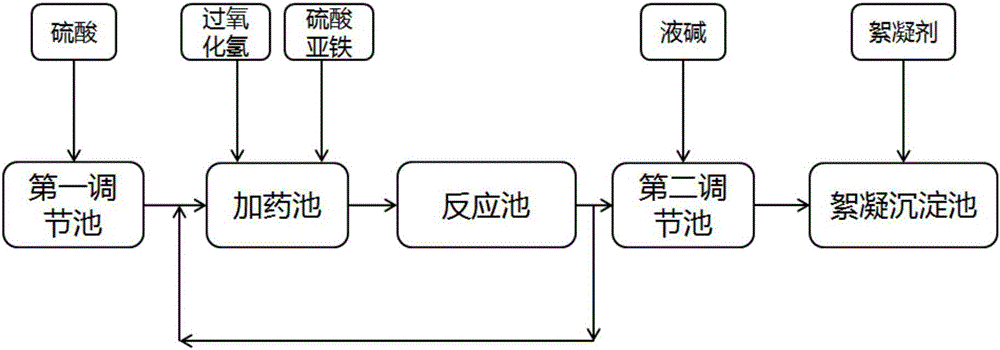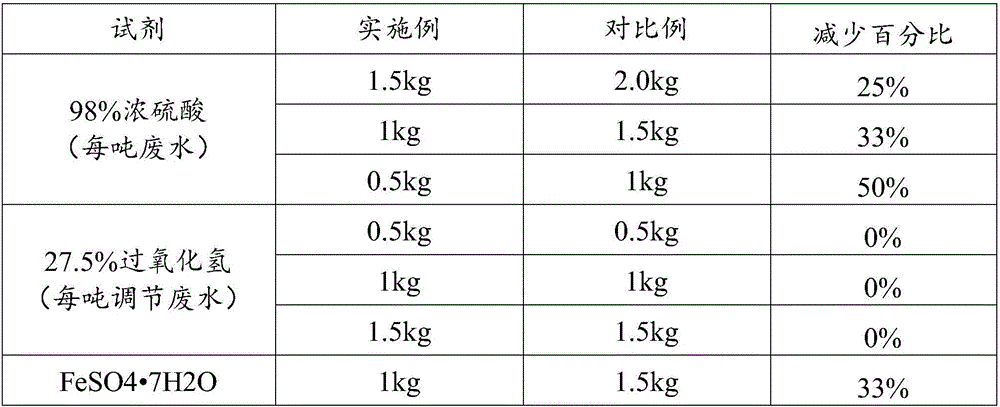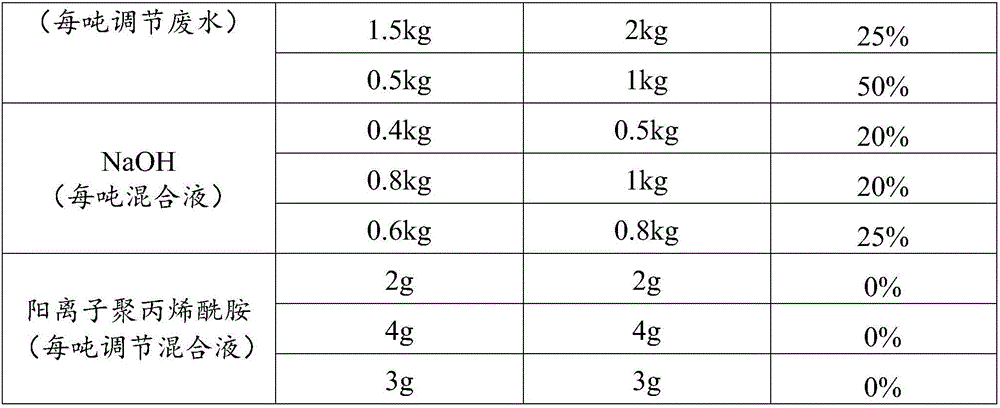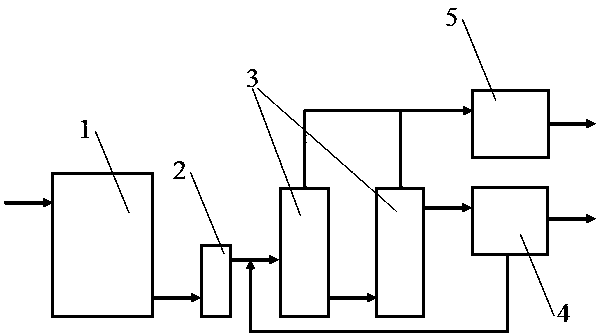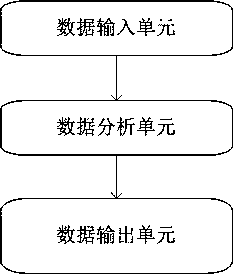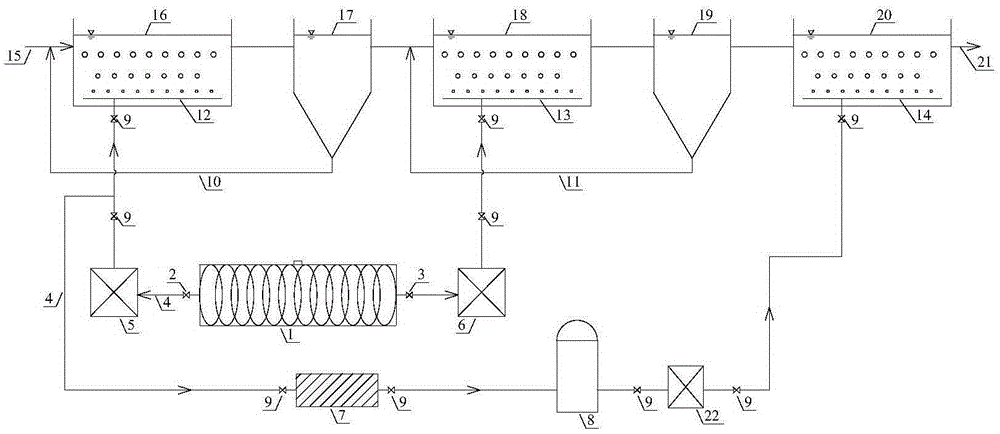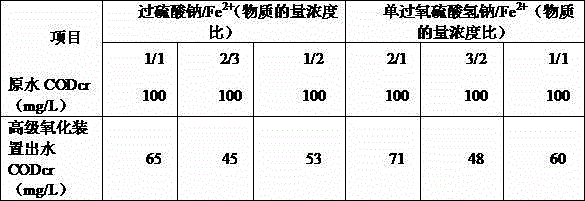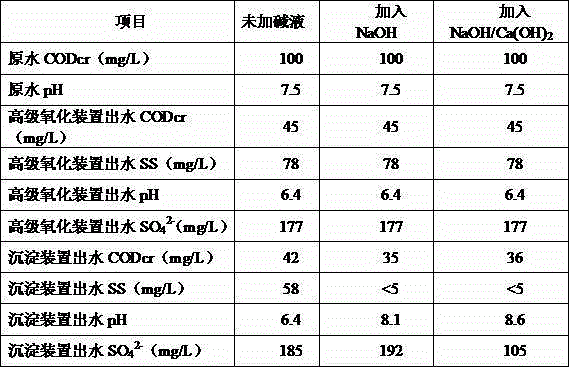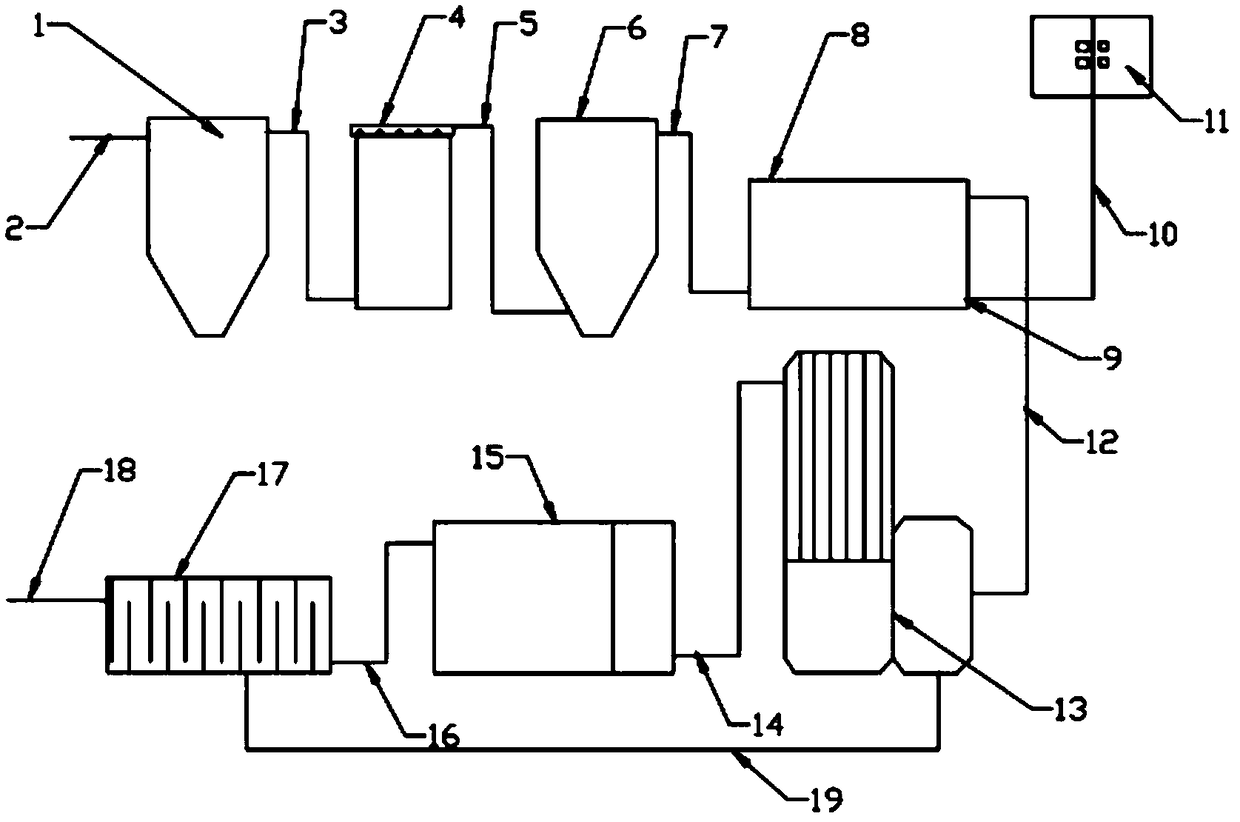Patents
Literature
Hiro is an intelligent assistant for R&D personnel, combined with Patent DNA, to facilitate innovative research.
64results about How to "Reduce the chromaticity of the water" patented technology
Efficacy Topic
Property
Owner
Technical Advancement
Application Domain
Technology Topic
Technology Field Word
Patent Country/Region
Patent Type
Patent Status
Application Year
Inventor
Carbon-iron microbattery slow-release carbon source filler and preparation method thereof
InactiveCN103723824AEliminate ChromaImprove biodegradabilityTreatment with anaerobic digestion processesAdhesivePortland cement
The invention discloses a carbon-iron microbattery slow-release carbon source filler and a preparation method thereof, belonging to the field of restoration of underground water pollution. The carbon-iron microbattery slow-release carbon source filler is composed of an inner core and an outer shell, wherein the inner core is made from organic carbon source mixed materials, and the outer shell is prepared from cement and high-permeability raw materials. The inner core is prepared from the following components in percentage by mass: 25-40% of natural carbon source material, 2-5% of adhesive, 20-37% of water, 15-25% of spongy iron, 10-15% of attapulgite and 2-6% of pH regulator; and the outer shell is prepared from the following components in percentage by mass: 45-53% of attapulgite, 22-25% of kieselguhr, 22-25% of ordinary Portland cement and 3-5% of water. By using the filler and method, the particle strength of the inner core can be enhanced to 70-105N / particle, and the thickness of the slow-release outer shell is lowered to 1-1.5 mm, so that the carbon-iron can be uniformly distributed in the material.
Owner:NANJING UNIV
System and method for deeply treating chemical wastewater and biochemical tail water
ActiveCN105236694AWide range of applicationsLow costWater contaminantsMultistage water/sewage treatmentPtru catalystSludge
The invention discloses a system and a method for deeply treating chemical wastewater and biochemical tail water, belonging to the technical field of wastewater treatment. The system comprises a physicochemical treatment system and a biochemical treatment system, wherein a distribution reservoir, a coagulating reaction tank, a sedimentation tank, an ozone oxidation reactor and a buffering tank in the physicochemical treatment system are connected in sequence; and the biochemical treatment system comprises a biological activated carbon filter, a drain tank and a sludge thickening tank. In the method, the pH value of the wastewater is regulated, and then, effluent is obtained after being sequentially subjected to coagulation, sedimentation, ozone oxidation and biological filter treatment, wherein part of sludge can be used as a catalyst to be recycled. Potassium permanganate and aluminum salt are used as a pre-oxidant and a coagulant, and manganese dioxide generated through reaction is used as an oxidant, an adsorbent, a catalyst and a reaction crystal nucleus, so that organic matters are further degraded, and the sludge settleability is improved. The effluent obtained through treating the wastewater by using the method disclosed by the invention can completely conform to the grade-A discharge standard of a wastewater treatment plant.
Owner:NANJING UNIV YANCHENG ENVIRONMENTAL PROTECTION TECH & ENG RES INST
Method for treating high-concentration organic process wastewater generated in production of 2-chloro-6-fluorobenzaldehyde
ActiveCN102115274AReduce pollution loadAchieve economyWater/sewage treatment by ion-exchangeMultistage water/sewage treatmentHigh concentrationDesorption
The invention discloses a method for treating high-concentration organic process wastewater generated in the production of 2-chloro-6-fluorobenzaldehyde. The method comprises the following steps: adding quicklime and flocculant into the wastewater and then regulating with acid; allowing the wastewater regulated with acid to pass through an adsorption tower filled with a nonpolar macroporous absorption resin I; respectively obtaining a primary saturated absorption resin and a primary eluent; performing desorption regeneration to the primary saturated absorption resin with a solvent I to obtaina solution after primary desorption; regulating the primary eluent with acid, and allowing the eluent regulated with acid to pass through an adsorption tower filled with a nonpolar macroporous absorption resin II; respectively obtaining a secondary saturated absorption resin and a secondary eluent; performing desorption regeneration to the secondary saturated absorption resin with a solvent II toobtain a solution after secondary desorption; and finally respectively recovering, purifying and separating the solution after primary desorption and the solution after second desorption to obtain 3-chloro-2-methylphenol, 2-chloro-6-fluorobenzaldehyde and 2-chloro-6-fluorobenzoicacid. The method can realize the organic combination of wastewater treatment and resource recovery.
Owner:ZHEJIANG DAYANG BIOTECH GROUP
Method for preparing binary-oxide composite solid acid catalyst and method for treating degradation-resistant organic pollutants by catalyzing oxidization of H2O2
InactiveCN103357413AImprove catalytic performanceNo lossWater contaminantsMetal/metal-oxides/metal-hydroxide catalystsSulfate radicalsMass ratio
The invention relates to a method for preparing a binary-oxide composite solid acid catalyst and a method for treating degradation-resistant organic pollutants by catalyzing oxidation of H2O2, belonging to the field of treatment and catalytic reaction of wastewater in environmental protection. The method for synthesizing the solid acid catalyst comprises the following steps: mixing SnCl4.5H2O with diatomaceous earth, adding Fe2(SO4)3 according to a certain mass ratio, and adjusting the pH value of the mixture by using strong aqueous ammonia to form sol; ageing, washing, settling centrifugally, drying, grinding and sieving the sol to obtain a precursor; and impregnating the precursor with sulfuric acids with different concentrations, filtering, drying and calcining to obtain the solid acid catalyst which takes a sulfate radical as an accelerator. The solid acid catalyst can form a heterogeneous Fenton system together with hydrogen peroxide to catalyze to generate a hydroxyl radical (.OH) for degrading pollutants and can be used for degrading the methylene-blue simulated wastewater, the methyl-orange simulated wastewater, the m-nitrobenzene simulated wastewater, the turquoise-blue real wastewater, the glyphosate real wastewater and the pharmaceutical-intermediate real wastewater quickly and effectively without adjusting the pH value of the wastewater and generating iron sludge, and thus fewer reagents are used. The solid acid catalyst has a strong sedimentation performance and can be recycled.
Owner:JIANGNAN UNIV
Combined treatment method of 1,4-butanediol production wastewater
InactiveCN103253827AReduce acidityWeak acidMultistage water/sewage treatmentNature of treatment waterHigh concentrationChemical oxygen demand
The invention relates to a combined treatment method of 1,4-butanediol production wastewater, which comprises the following steps: carrying out physical and chemical pretreatment on wastewater firstly so as to obtain pre-optimized wastewater; improving the biodegradability of the wastewater and further reducing the COD (chemical oxygen demand) concentration of the wastewater through an upflow anaerobic reactor and an aerobic combined biochemical reaction tank; and after the muddy water separation of the wastewater is realized through a secondary sedimentation tank, sequentially feeding the wastewater into a coagu-flocculation reaction settling pond and a biological filter, carrying out deep treatment on the wastewater, removing substances such as tiny suspended solids and colloids and the like in the wastewater through coagu-flocculation reaction and precipitation, and enabling discharged water to meet the requirements of one-class A standards in the Discharge Standard of Pollutants for Municipal Wastewater Treatment Plant (GB18918-2002) through the synergistic effect of adsorption and biodegradation of the biological filter. The method disclosed by the invention not only has a stable removal effect on COD in 1,4-butanediol production wastewater, but also can effectively resist violent water impacts; and the method has the characteristics of rapid system startup and the like. The method disclosed by the invention also can be applied to the treatment of other high-concentration toxic degradation-resistant organic wastewater with a water quality similar to that of 1,4-butanediol production wastewater.
Owner:TONGJI UNIV +1
Method for preparing compound water purifying agent for emergency treatment of water pollution of drinking water source
InactiveCN101973615AReduce dosageImprove the water effectWater/sewage treatment by flocculation/precipitationWater/sewage treatment by oxidationWater sourceSludge
The invention discloses a method for preparing a compound water purifying agent for emergency treatment of water pollution of a drinking water source, which comprises the following steps of: grinding concave soil raw ore into fine powder, and sieving by using a sieve with 100 to 300 meshes to obtain concave soil powder; calcining the concave soil powder at the temperature of between 350 and 500 DEG C for 1 to 5 hours, or radiating the concave soil powder by using microwaves with the power of 300 to 600W for 5 to 15 minutes to obtain modified concave soil; and mixing the modified concave soil and an inorganic polymer coagulant accounting for 5 to10 weight percent of the modified concave soil and potassium permanganate accounting for 1 to 5 weight percent of the modified concave soil in aqueous solution, stirring for uniform dispersion, drying, and grinding to obtain the water purifying agent finished product. The compound water purifying agent can obviously reduce the content of organic matters, algae toxins, heavy metals and the like in the water of the polluted drinking water source, the manufacturing cost is low, the operating process is simple, the sedimentation velocity is high, the sludge volume is small, the residues of inorganic reagents are a few, and the compound water purifying agent has chemical and biological safety and is a novel environment-friendly and high-efficiency water purifying agent for emergency treatment of the water pollution of the drinking water source.
Owner:HUAIYIN INSTITUTE OF TECHNOLOGY
Method and device for treating printing and dyeing wastewater by using macroporous adsorption resin
InactiveCN103043857ALarge specific surface areaSmall sizeMultistage water/sewage treatmentWaste water treatment from textile industryFixed bedDyeing wastewater
The invention relates to a method and a device for treating printing and dyeing wastewater by using a macroporous adsorption resin. The method comprises the following technical steps: (1) adding a sodium hydroxide solution to an acidity and alkalinity regulating pond, regulating the pH value of the printing and dyeing wastewater to be more than 8.5, and then discharging the printing and dyeing wastewater into a primary precipitation pond, charging 25% of ferrous sulfate into the primary precipitation pond so as to carry out coagulating precipitation on the printing and dyeing wastewater, discharging the coagulated and precipitated printing and dyeing wastewater into a hydrolyzation pond so as to carry out anaerobic hydrolysis on the printing and dyeing wastewater, precipitating the printing and dyeing wastewater in a secondary precipitation pond, and discharging the printing and dyeing wastewater into an aeration pond so as to carry out aerobic aeration biological treatment on the printing and dyeing wastewater; (2) discharging the aerated wastewater into a tertiary precipitation pond and then filtering suspended solids in the wastewater through a sand filter tank; and (3) enabling sand filtered water to enter a macroporous adsorption resin fixed bed, adsorbing the sand filtered water through the macroporous adsorption resin fixed bed and discharging out the adsorbed water. The wastewater treatment method provided by the invention has the advantages as follows: through the adoption of the macroporous adsorption resin with large specific surface area, high adsorbing efficiency, low cost and simple regeneration, the treatment is efficient, economic, stable, reliable, low-carbon and environment-friendly and adapts to time development; and the wastewater treatment method can be promoted and used in printing and dyeing wastewater treatment.
Owner:SHAOXING HEQIAO JIANGBIN WATER TREATMENT
Dyeing wastewater advanced treatment method and device by using ozone, oxydol and activated carbon
InactiveCN105858950AImprove catalytic performanceImprove ozone utilizationTreatment involving filtrationMultistage water/sewage treatmentFiberActivated carbon
The invention relates to a dyeing wastewater advanced treatment method and device by using ozone, oxydol and activated carbon. The method comprises the following steps: floatation effluent water passes through a fiber rotary table filter tank to remove suspended substances and enters a quick mixing tank, H2O2 is added into the quick mixing tank, the effluent water enters an ozone contact tank, H2O2 and O3 are simultaneously added into the tank to degrade nondegradable organic matters, the effluent water enters an activated carbon filter tank, and ozone is added into the activated carbon filter tank; the effluent water of the activated carbon filter tank enters a filter tank effluent water storage tank, and is discharged by a pump; and by using the filter tank effluent water storage tank as a back flushing water tank, back flushing wastewater is discharged into the activated carbon filter tank to perform back flushing on a wastewater recovery tank. By using the H2O2 and the activated carbon which carries the Fe2O3-CuO-MnO2-CeO2 catalyst and adding the ozone in different stages, the method has the characteristics of high catalytic efficiency, high ozone utilization ratio, favorable COD (chemical oxygen demand) removal effect, low cost and the like, so that the device has the characteristics of high treatment efficiency, high economy, high stability, high reliability, low carbon and environment friendliness.
Owner:SHAOXING HEQIAO JIANGBIN WATER TREATMENT
Coupling processing technology for steadily improving biodegradability of coking wastewater
InactiveCN104609652AHigh activityLarge specific surface areaMultistage water/sewage treatmentHigh concentrationElectrolysis
The invention discloses a coupling processing technology for steadily improving biodegradability of coking wastewater. The coupling processing technology disclosed by the invention comprises the following steps: the quality of water in a primary adjusting pool is adjusted; the water enters an iron carbon active coke reaction tower for realizing a micro electrolysis and active coke adsorbed coupling reaction; after a catalytic oxidation reaction, the obtained water enters a secondary adjusting pool to be mixed with a part of the coking wastewater, and then the quality of the water is adjusted; coagulation, sedimentation and the like are performed. According to the method, the iron carbon active coke subjected to high-temperature sintering and microporous activation is used as a filler, H2O2 / O3 and the like are used as a catalytic oxidizer, so that the biodegradability of the effluent from a system is steadily improved to 0.5 or more. The coupling processing technology for steadily improving the biodegradability of the coking wastewater disclosed by the invention has the advantages that the processing effect is steady, the reliability is high, and the operating cost is low. Besides, the coupling processing technology can be promoted to the field of high-concentration organic wastewater which is difficult to degrade, such as printing and dyeing wastewater, chemical wastewater, pharmaceutical wastewater, and the coupling processing technology effectively solves the problems that the biodegradability of the coking wastewater is poor, a traditional micro electrolysis filler is likely to harden, the yield of sludge is large, and the operating cost is high.
Owner:HEBEI IRON AND STEEL
Novel combined process for treating coking wastewater
InactiveCN102617000AEfficient removalFull coagulation and sedimentationMultistage water/sewage treatmentSludgeExisting Treatment
The invention discloses a novel combined process for treating coking wastewater. According to the invention, by considering the characteristics of the coking wastewater and the domestic existing treatment conditions, the novel combined process adopts a novel combined treatment process to carry out oil isolation / floatation, O / A / O and coagulating sedimentation to solve the problem in the existing technology for treating the coking wastewater. The whole process flow is divided into three paths: a water treatment path, a sludge oil treatment path and a medicament path. The novel combined process disclosed by the invention has the advantages of low operation cost, high biochemical efficiency, capability of continuously discharging with standards, good ammonia nitrogen removing effect, difficulty in causing secondary pollution and low deep treatment cost, and is suitable to be popularized and applied.
Owner:四川鑫超越环保科技有限公司
Preparation of hydroxyl oxidize iron modified filtering material and application
InactiveCN101279167ASmall particle sizeImprove adsorption removal effectFiltration separationHigh absorptionFilter media
The invention discloses a preparation method of hydroxyl oxidize iron modified filter media and application thereof, which relates to a preparation method of the modified filter media and the application thereof. The invention solves the problems that adsorption strength on a carrier is low, an absorption layer is easy to drop off and the service life of the filter media is short in the currently adopted modified filter media. The preparation method of the hydroxyl oxidize iron modified filter media comprises the steps that: first, the carrier is soaked in acid and then soaked in a ferric chloride solution; second, washing is carried out; third, drying is carried out. The hydroxyl oxidize iron modified filter media is obtained. The hydroxyl oxidize iron modified filter media of the invention is used for purifying water. The hydroxyl oxidize iron modified filter media prepared by the invention has large specific surface area and high absorption strength and does no harm to human bodies; the combination between hydroxyl oxidize iron and the carrier is relatively firm and service life is long.
Owner:HARBIN INST OF TECH
Method for treating sewage by DSD acid reduction acid bleeding
InactiveCN1176864CPromote oxidationEasy to separateMultistage water/sewage treatmentFerrous saltsWastewater
Owner:LUYUAN ENVIRONMENTAL PROTECTION ENG HEBEI
Intensive treatment method and system for complex high-concentration organic ammonia-nitrogen wastewater
ActiveCN109879527AGood removal effectPromote aggregationMultistage water/sewage treatmentContaminated groundwater/leachate treatmentIntensive treatmentSmall footprint
The invention provides an intensive treatment method and system for complex high-concentration organic ammonia-nitrogen wastewater. The system includes a water collecting regulating tank, an oil separator, a coagulation reaction tank, a inclined tube sedimentation tank, a Fenton reaction tank, an air flotation device, a Biochemical regulation tank, an A / O biochemical pool, an MBR membrane tank, anultrafiltration system, a same-position nitrification denitrification filter bed, a reverse osmosis system and a discharge tank which are connected in sequence; the method comprises the following steps: pre-treating the complex high-concentration organic ammonia nitrogen wastewater, adjusting the pH to acidity, performing flocculation, Fenton oxidation, biochemical regulation, A / O process, membrane treatment, filter bed treatment, reverse osmosis treatment, and up-to standard discharge. The method and the system greatly shorten the residence time of the complex high-concentration organic ammonia nitrogen wastewater in the biochemical treatment process, solve the problem of difficult wastewater treatment, have low maintenance and operation cost, have small floor space, improve operation efficiency, reduce filtration bed treatment and membrane treatment load, and can prolong the service life of the filter bed and membrane and reduce the cost.
Owner:JIANGXI GAIA ENVIRONMENTAL SCI & TECH CO LTD +1
Rural domestic sewage self-driven landscape ecological treatment method and system
ActiveCN109879528AGood removal effectPromote aggregationMultistage water/sewage treatmentAutomatic controlWater quality
The invention provides a rural domestic sewage self-driven landscape ecological treatment method and system. The system comprises an automatic control system, a sewage detection device, and a dosing device; the automatic control system is electrically connected with a solar power supply device; the sewage detection device is electrically connected with the automatic control system; the sewage treatment device comprises a water collecting tank, a Biochemical adjusting tank, an A / O biochemical tank, a same-position nitrification denitrification filter bed, a discharge tank and a variable-frequency controller; the automatic control system is electrically connected with the automatic control system; the frequency conversion controller is electrically connected with the automatic control system; and the dosing device is electrically connected with the automatic control system. According to the method and the system, the residence time of rural domestic sewage in the biochemical treatment process is greatly shortened, the problem that rural domestic sewage is difficult to treat is solved, the effluent quality is stable and up to the standard, the later maintenance application cost is low, the occupied area is small, the operation efficiency is improved, and the cost is reduced; meanwhile, landscape plants are loaded on the filter bed, nutrient substances in the sewage can be absorbed, the landscape plants are capable of being matched with a rural environment landscape, and the landscape plants are free of foul smell and can meet the construction requirements of the rural environment.
Owner:JIANGXI GAIA ENVIRONMENTAL SCI & TECH CO LTD +1
Waste water treating and resourcelization method for tobias acid production
InactiveCN1775698ARealize resourcesPromote regenerationMultistage water/sewage treatmentWater/sewage treatment by neutralisationHigh concentrationTobias acid
The invention discloses a tobias acid production waste water controlling and resource recovering method, and the method regulates the pH value of the tobias acid production waste water, filters and makes main organic matters in the waste water absorbed on resin by the combination process of macroporous weakly basic resin and ultrahigh cross-linking absorption resin. The crude waste water: puce, chroma 1500-2000, iodinated tobias acid concentration 12000-15000 mg / L, tobias acid and 2, 1-acid concentration 6000-7000 mg / L, and COD 45000-5000 mg / L, and the processed waste water: chroma 10-50, iodinated tobias acid concentration < 500mg / L, tobias acid and 2, 1- acid concentration <50 mg / L, CODCr<1500mg / L, and the resins are regenerated by liquid alkali and water de-absorption, the high concentration deabsorption solution returns to amination stage of the tobias acid producing process, low concentration deabsorption solution is used indiscriminately in the next deabsoption operation, the sulphonated tobias acid is above 10 kg recovered from per cubic meter of waste water sample and the tobias acid is above 5 kg.
Owner:NANJING UNIV +1
Preparation method of binary-metal-oxide composite solid acid catalyst and application of catalyst to treatment of organic wastewater
InactiveCN103357414AReduce the chromaticity of the waterAvoid pHWater contaminantsMetal/metal-oxides/metal-hydroxide catalystsSolid acidNitrobenzene
The invention relates to a preparation method of a binary-metal-oxide composite solid acid catalyst and an application of the binary-metal-oxide composite solid acid catalyst to the treatment of organic wastewater, belonging to the field of treatment and catalytic reaction of wastewater in environmental protection. The preparation method comprises the following steps: mixing an ethanol solution of SnCl4.5H2O with Fe2(SO4)3, and adjusting the pH value of the mixture to 9 by using aqueous ammonia to form sol, wherein the ethanol solution of SnCl4.5H2O and the Fe2(SO4)3 are at a certain mass ratio; and ageing, washing, settling centrifugally, drying, grinding and sieving the sol, stirring and mixing the sol and washed and dried diatomaceous earth violently by using a ball grinder, and calcining the mixture at a high temperature to obtain a tin-ferrum-silicon solid acid which takes a metal oxide as an accelerator. The solid acid catalyst can form a heterogeneous Fenton system together with hydrogen peroxide to degrade pollutants and can be used for rapidly and effectively degrading the methylene-blue simulated wastewater, the methyl-orange simulated wastewater, the m-nitrobenzene simulated wastewater, the turquoise-blue dye wastewater, the glyphosate pesticide wastewater and the pharmaceutical-intermediate wastewater without adjusting the pH value of the wastewater, thus fewer reagents are used. The solid acid catalyst has an effect of bleaching by nearly 100% and a strong sedimentation performance and can be recycled.
Owner:JIANGNAN UNIV
Advanced treatment technology for wastewater
ActiveCN106517670AImprove fluidityReduce usageMultistage water/sewage treatmentWaste water treatment from plant processingFlocculationSulfate
The invention discloses an advanced treatment technology for wastewater. The technology comprises following steps: wastewater subjected to biochemical treatment is sent to a first regulating tank, pH is regulated to be 4-5, and regulated wastewater is obtained; the regulated wastewater is sent to a chemical feeding tank, the chemical feeding tank comprises two completely isolated units with the same size, a hydrogen peroxide solution and a ferrous sulfate solution are added to the two units respectively and mixed with the regulated wastewater respectively, and first mixed wastewater and second mixed wastewater are obtained; the first mixed wastewater and the second mixed wastewater are sent to a reaction tank for reaction, and a mixed solution is obtained; the mixed solution is sent to a second regulating tank, pH is regulated to be 6-7, and a regulated mixed solution is obtained; the regulated mixed solution is sent to a flocculation and sedimentation tank for flocculation and sedimentation. With the adoption of the treatment technology, the problems of overhigh side reaction flux, reduced main reaction efficiency, chemical waste and the like caused by overhigh local chemical concentration in the reaction tank can be effectively solved.
Owner:TIANJIN CARING TECH DEV
Technology for treating high-concentration wastewater of tobacco sheet industry by electrochemical oxidation method
InactiveCN103395917AReduce the chromaticity of the waterImprove biodegradabilityMultistage water/sewage treatmentSludgeTreatment system
The invention discloses a technology for treating high-concentration wastewater of tobacco sheet industry by an electrochemical oxidation method. The high-concentration wastewater is conveyed into a coagulating basin via a collection device, coagulant and flocculant are added into the coagulating basin for performing coagulation treatment, and sludge generated by reaction is discharged into a sludge treatment system; the liquid supernatant of reaction is conveyed to an electrochemical oxidation reaction tank for performing oxidation treatment, the liquid supernatant generated after reaction is mixed with the low-concentration wastewater, the mixture is conveyed to a low-concentration wastewater treatment system, and the sludge generated by reaction is discharged into the sludge treatment system. With the technology provided by the invention, the chromaticity in water can be removed completely, the chromaticity of the system effluent is guaranteed to be less than 80 times, and the system effluent can reach the first grade of waste discharge standard; the substances which are difficult to degrade in the high-concentration wastewater can be removed, thus, the biodegradation capability of the whole system is improved.
Owner:上海正泽环保科技有限公司
Ultrafiltration device for processing papermaking wastewater and application method thereof
InactiveCN103663628AReduce contentAchieving zero emissionsUltrafiltrationWater/sewage treatment bu osmosis/dialysisSeparation technologyPapermaking
The invention proposes an ultrafiltration device for processing papermaking wastewater and an application method thereof. The wastewater of a papermaking process section of a tobacco sheet manufactured by adopting a paper-making process is treated by employing a small-aperture rolled ultrafiltration membrane separation technology, useful substances in the wastewater are concentrated while being purified, and the concentrated liquor can be reused in the papermaking process section, so that the papermaking efficiency is improved, and the problem that the useful substances in the existing treatment technologies such as coagulation, biochemistry and the like of the papermaking wastewater are wasted is solved. The ultrafiltration device for processing the papermaking wastewater comprises a pretreatment tank, a coarse filter tank, an ultrafiltration device body, a concentrating tank and a water producing tank; the coarse filter tank is communicated with the pretreatment tank, and used for coarsely filtering the pretreated wastewater; the ultrafiltration device body is communicated with the filter tank, and used for processing and concentrating the wastewater; the concentrating tank is communicated with a thick water outlet of the small-aperture rolled ultrafiltration device, and used for storing the concentrated liquor containing useful substances; and the water producing tank is communicated with a water producing outlet of the small-aperture rolled ultrafiltration device and used for storing ultrafiltration water.
Owner:北京清大国华膜科技有限公司
Intelligent application program and optimization method for Fenton oxidation technology
ActiveCN109607737AIncrease autonomyImprove work efficiencyWater contaminantsMultistage water/sewage treatmentSludgeProcess engineering
The invention provides an intelligent application program and an optimization method for a Fenton oxidation technology. The intelligent application program comprises: a data input unit, which comprises the following main parameters: the COD concentration of raw water, an expected removal rate of COD, the molar ratio of H2O2 to Fe2+, etc.; a data analysis unit, which comprises the following main parameters: a pure H2O2 amount / COD concentration ratio (K1), the molar number of pure H2O2, the molecular weight of FeSO4.7H2O, the addition amount of Fe2+, etc.; and a data output unit, which comprisesthe following main parameters: the addition amount of the FeSO4.7H2O, the addition volume of H2O2 with a concentration of 28%, the addition amount of the pure H2O2, etc. The intelligent application program provided by the invention can quickly predict the effect of treatment and the cost of chemical addition, obtains an optimal chemical addition amount and a treatment scheme in the shortest time,and makes rapid response to market demands; meanwhile, through addition of a proper amount of a flocculant, rapid settling of sludge is realized, and deviation caused by difficult settling of redundant and excessively-fine floc is easily avoided.
Owner:GO HIGHER ENVIRONMENT GRP CO LTD
Method for treating chrome plating wastewater by flocculant
InactiveCN103663658AImprove water purification effectFloc settling speed is fastWaste water treatment from metallurgical processWater/sewage treatment by flocculation/precipitationSulfateWastewater
The invention discloses a method for treating chrome plating wastewater by a flocculant. The chrome plating wastewater is taken and is added with the flocculant PAFS (Polymeric Aluminum Ferric Sulfate); after the reaction is performed for 15min, standing is carried out for 12 hours, wherein the mass ratio of Fe to Al in the PAFS is 7 to 13. The method for treating the chrome plating wastewater, disclosed by the invention, has the advantages that the purposes of broad spectrum and low toxicity are realized, the adopted raw materials are cheap, the treatment effect is good, and the operation is simple.
Owner:SHANDONG HUASHENG CHEM TECH
Municipal sewage reclamation treatment device and treatment method adopting same
ActiveCN105254129AImprove removal efficiencyReduce pool capacitySludge treatment by de-watering/drying/thickeningMultistage water/sewage treatmentOzone generatorAeration system
The invention relates to a municipal sewage reclamation treatment device and a treatment method adopting the same. The device comprises a blast aeration system and a sewage treatment system, wherein the blast aeration system comprises a membrane air separator, an oxygen compression tank and a nitrogen compression tank; the sewage treatment system comprises an oxygen refiner, an ozone generator, an aeration tank, a sedimentation tank, a self-oxidation denitrification tank, a secondary sedimentation tank and an ozone contact tank; the municipal sewage passes through a water inlet pipe, is sequentially treated by the aeration tank, the sedimentation tank, the self-oxidation denitrification tank, the secondary sedimentation tank and the ozone contact tank, which are connected in order, and then passes through a water outlet pipe to obtain reclaimed water; the ozone generator is connected with the oxygen refiner and an ozone aeration tray at the bottom of the ozone contact tank respectively by valves. The treatment device and the treatment method have the advantages of simple structure, reasonable design, flexibility and convenience in operation and use, high treatment efficiency, high effluent quality, stability in operation of the device, safety, reliability, and the like.
Owner:BEIJING DRAINAGE GRP CO LTD
Method for treating chrome tanning wastewater through composited flocculation method and chelation method
InactiveCN103693782AFast formingSettling fastWater contaminantsMultistage water/sewage treatmentFlocculationEmission standard
The invention discloses a method for treating chrome tanning wastewater through a composited flocculation method and a chelation method, wherein the composited flocculation method and the chelation method are combined to treat the chrome tanning wastewater, so that the treated chrome tanning wastewater can be recycled. The method for treating the chrome tanning wastewater through the composited flocculation method and the chelation method has the advantages of low investment and cost, high efficiency, simple equipment and operation, and space saving, and treated chrome tanning wastewater is better than the chromium chrome tanning in the emission standard.
Owner:SHANDONG HUASHENG CHEM TECH
A method for advanced oxidation advanced treatment of papermaking wastewater by ferrous salt activated persulfate or monoperoxyhydrogensulfate
InactiveCN103818993BImprove applicabilityStrong oxidation abilityWater treatment parameter controlSpecific water treatment objectivesAluminium chlorideSulfate radicals
Owner:SOUTH CHINA UNIV OF TECH
Method for treating washing wastewater by using composite-film modified sintered gangue ceramsite
InactiveCN102923836AEconomical and efficient processingReduce dosageWater/sewage treatment by oxidationChemical oxygen demandPtru catalyst
The invention discloses a method for treating washing wastewater by using composite-film modified sintered gangue ceramsite, belonging to the technical field of wastewater treatment in explosives industries. The method comprises the following steps: using the sintered gangue ceramsite modifiedx by using a TiO2 / SiO2 composite film as a filling substance; using ultraviolet as a potential radiation source; stimulating a catalyst to produce holes and duplets, and making use of the strong oxidation-reduction function to treat the washing wastewater produced in the dinitrodiazophenol production process. The method provided by the invention not only overcomes the problem of long photo-catalytic oxidation time of pure TiO2-modified ceramsite for treating the dinitrodiazophenol washing wastewater, but also has small dosage of raw materials compared with a traditional catalytic oxidation method, the chromaticity and the COD (chemical oxygen demand) have good removal effects; the effluent quality can meet the discharge requirement of Discharge Standard for Water Pollutants from Ordance Industry Ammunition Loading (GB14470.3-2002), the operation is rather concise, the reaction process cannot generate colored ions, and the effluent chromaticity is also reduced.
Owner:CHANGZHOU UNIV
Process for treating high-concentration organic wastewater in tobacco sheet industry
InactiveCN104276700AReduce the chromaticity of the waterImprove biodegradabilityWater contaminantsWater/sewage treatmentHigh concentrationFenton reaction
The invention provides a process for treating high-concentration organic wastewater in the tobacco sheet industry. The process comprises the following steps: high-concentration organic wastewater flows through a collection device and enters a coagulating basin, and a coagulant and a flocculating agent are added into the coagulation basin for coagulation treatment; the supernatant enters an electrocoagulation reaction pool; and treated wastewater enters a FENTON reaction pool, the supernatant of the high-concentration organic wastewater treated by strong oxidation and low-concentration wastewater are mixed and enter a low-concentration sewage treatment system, and sludge generated in reactions is discharged into a sludge treatment system. By adopting the process, the chrominance in water can be completely removed, and the effluent chrominance of the system is less than 80 times, and achieves the first-grade drainage standard; and refractory substances in the high-concentration wastewater can be removed, and the biochemical availability of the whole system can be improved.
Owner:上海正泽环保科技有限公司
Preparation of hydroxyl oxidize iron modified filtering material and application
InactiveCN100593431CSmall particle sizeImprove adsorption removal effectFiltration separationHigh absorptionFilter media
The invention discloses a preparation method of hydroxyl oxidize iron modified filter media and application thereof, which relates to a preparation method of the modified filter media and the application thereof. The invention solves the problems that adsorption strength on a carrier is low, an absorption layer is easy to drop off and the service life of the filter media is short in the currentlyadopted modified filter media. The preparation method of the hydroxyl oxidize iron modified filter media comprises the steps that: first, the carrier is soaked in acid and then soaked in a ferric chloride solution; second, washing is carried out; third, drying is carried out. The hydroxyl oxidize iron modified filter media is obtained. The hydroxyl oxidize iron modified filter media of the invention is used for purifying water. The hydroxyl oxidize iron modified filter media prepared by the invention has large specific surface area and high absorption strength and does no harm to human bodies;the combination between hydroxyl oxidize iron and the carrier is relatively firm and service life is long.
Owner:HARBIN INST OF TECH
Electro-catalysis efficient decoloration method and device for oil field waste liquid
ActiveCN108892288AChange the surface chargeAvoid hard collisionWaste water treatment from quariesWater treatment parameter controlLiquid wasteFlocculation
The invention provides an electro-catalysis efficient decoloration method and device for oil field waste liquid. The method comprises the following steps: carrying out acidification aeration treatmenton the oil field waste liquid; carrying out electro-catalysis oxidation treatment on the oil field waste liquid after the acidification aeration treatment; and after the electro-catalysis oxidation treatment, carrying out delayed standing stirring settling, so as to finish the efficient decoloration of the oil field waste liquid. By utilizing an acidification aeration preoxidation-electrocatalytic oxidation-delayed reaction settling combined process, the addition of a chemical agent in the treatment process of operation waste liquid is effectively reduced, the sludge output is decreased to bebelow 20% of that of a conventional chemical mixed flocculation process, the chroma removing rate is stabilized over 85%, and the comprehensive treatment cost is lowered by over 20%.
Owner:BC P INC CHINA NAT PETROLEUM CORP +1
Device and method for deeply treating oxadiazon production wastewater
InactiveCN109354338AReduce organic contentImprove biodegradabilityTreatment with aerobic and anaerobic processesMultistage water/sewage treatmentFlocculationElectrolysis
The invention provides a device and a method for deeply treating oxadiazon production wastewater and relates to the technical field of sewage treatment. The device comprises a pre-settling tank, a micro-electrolysis reactor, a flocculation tank, a decoloring tank, an ozone generation device, a MVR evaporator, an A / O biochemical tank and an electrocatalysis oxidation tank. The method is formed by effectively combining settling treatment, microelectrolysis, flocculation settling, decoloring process, MVR evaporation process, A / O process and electrocatalysis oxidation process. The device and the method are good in effect of reducing wastewater pollution, low in cost and high in safety coefficient.
Owner:KESHENG ENVIRONMENTAL PROTECTION TECH CO LTD
Treatment method of landfill leachate based on GY-3 type filler matrix
ActiveCN109775930AAvoid cloggingImproves resistance to hydraulic shockMultistage water/sewage treatmentContaminated groundwater/leachate treatmentPre treatmentAnaerobic treatment
The invention provides a treatment method of landfill leachate based on a GY-3 type filler matrix. The method comprises the following steps: 1) primary biochemical treatment: pretreating the landfillleachate, and treating the pretreated landfill leachate in a filter bed provided with the GY-3 type filler matrix; 2) precipitation treatment: introducing the treated landfill leachate obtained in step 1) into a precipitation tank, performing precipitation, and discharging the obtained precipitate from the bottom of the tank; 3) secondary biochemical treatment: introducing the treated landfill leachate obtained in step 2) to an anaerobic biological tank, and carrying out anaerobic treatment; and 4) filtration treatment: filtering the anaerobic treated wastewater, and discharging the standard-reaching filtered wastewater, wherein the GY-3 type filler matrix contains Pseudoxanthomonas, Sphingomonas, Comamonadaceae and Hyphomicrobiaceae microbes. The treatment method realizes the purificationand discharge of the landfill leachate by degrading organic matters in the landfill leachate with the GY-3 type filler matrix; and the treatment method has the advantages of high efficiency and rapidness in starting of the treatment, short time, stable treatment effect, and simplicity in operation and running.
Owner:JIANGXI GAIA ENVIRONMENTAL SCI & TECH CO LTD +1
Features
- R&D
- Intellectual Property
- Life Sciences
- Materials
- Tech Scout
Why Patsnap Eureka
- Unparalleled Data Quality
- Higher Quality Content
- 60% Fewer Hallucinations
Social media
Patsnap Eureka Blog
Learn More Browse by: Latest US Patents, China's latest patents, Technical Efficacy Thesaurus, Application Domain, Technology Topic, Popular Technical Reports.
© 2025 PatSnap. All rights reserved.Legal|Privacy policy|Modern Slavery Act Transparency Statement|Sitemap|About US| Contact US: help@patsnap.com
